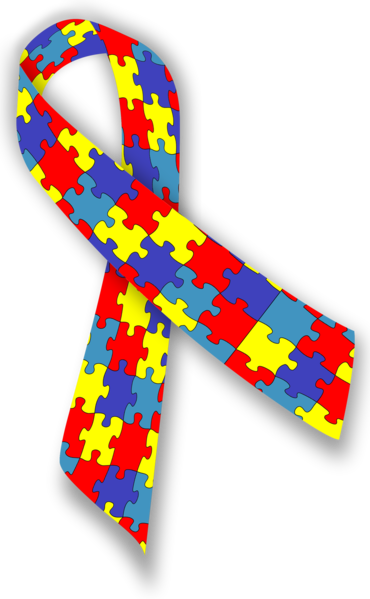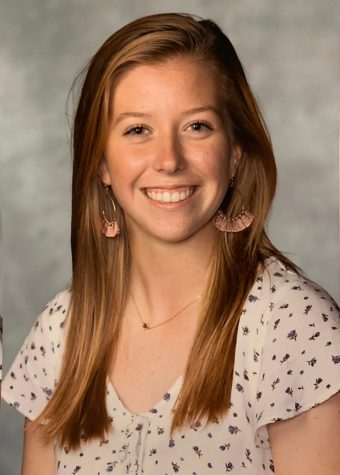Honoring Neurodiversity During Autism Acceptance Month
Social Justice Club Morning Announcements Honor Neurodivergent Individuals

https://commons.wikimedia.org/wiki/File:Autism_Awareness_Ribbon.png

In the year 2020, according to the Autism Society, 1 in 54 children in America were diagnosed with autism, rising from 1 in 125 only ten years prior. Autism is a developmental disorder that is known to affect the ability to socialize and interact with others, and yet we still have much to learn. It is up to scientists to continue to study this neurodiversity, or “spectrum,” of brain function. However, as Morgan students, we can support our neurodivergent friends by learning about neurodivergent figures who have contributed to society.
This April, the Morgan Social Justice club is recognizing Neurodiversity and Autism Acceptance Month through school announcements written by senior Emma Lindsay.

This is a commemoration of the accomplishments that neurodivergent people, including Emily Dickinson, Bill Gates, and Michelangelo, have made. It is important to remember that these divergences do not hinder people from completing great feats, from writing poetry to founding companies to playing professional sports.
While we celebrate neurodiversity this month, let’s remember that it’s important to recognize those on the spectrum year-round. Below are the announcements honoring neurodivergent individuals.
Thursday, April 1st:
Today the social justice club would like to honor Tim Burton, a talented and creative director who brought us so many childhood classics like The Nightmare Before Christmas, Corpse Bride, and
Edward Scissorhands. While we all know Burton as a unique, intelligent, and comedic individual, but Burton often struggled in social situations, feeling misunderstood and a bit neurotic. Although he has not had the chance to be formally diagnosed, Burton identifies with the neurodiverse community and believes he has a moderate case of Asperger’s Syndrome. Instead of letting these behavioral differences hold him back, he decided to honor them in his art, making the main characters of his film reflective of his own personality and people like him. We thank Tim Burton for illustrating neurodivergent individuals in his films and allowing us to see the world through his eyes.
Monday, April 5th:
Today we would like to honor American poet, Emily Dickinson. Emily Dickinson was one of the most prominent and influential poets of her time, challenging the conventional restraints of poetry and diving into abstract escapes from society. Dickinson was often held back by her gender, forcing her to write anonymously, but she also was believed to live with Autism Spectrum Disorder. She was described as reserved and awkward in social situations, but through her beautiful writing, we can see that she was simply thinking beyond her surroundings, looking for solutions that many people in her time could not see. Thank you, Emily Dickinson, for allowing us to see what was going through your beautiful mind.
Tuesday, April 6th:
Today we would like to honor Bill Gates, one of the richest men in the world. He is co-founder of Microsoft, the largest software business in the world, and is known for his intelligence and genius business models. Although he was never formally diagnosed, many experts believe he has some form of Autism Spectrum Disorder due to his behavior patterns. We are honoring him today because so many individuals who live with Autism Spectrum Disorder, diagnosed or not, use their intelligence to better our society, just like Bill Gates. We should respect these individuals and refrain from using them as a punchline. Thank you, Bill Gates, out society would not be the same without you.
Wednesday, April 7th:
Today we would like to honor John Howard, American mixed martial arts fighter. He was a fighter from day one, proving his strength in his dangerous neighborhood and then in the boxing ring when he honed his skills to become one of the strongest modern MMA fighters. From a young age, Howard thrived in repetition but struggled in social situations. He never understood why he functioned this way until at the age of 33 when he was diagnosed with autism. Howard is a part of a large group of individuals who lacked resources and support systems to get them diagnoses that would bring comfort and understanding to their behavioral patterns. Thank you, John Howard, for using your strength for more than just fighting and teaching us to embrace our differences and the communities we are a part of.
Thursday, April 8th:
Today we would like to honor one of our favorite Ghostbusters, Dan Aykroyd. We all know Aykroyd for his comedic and lively energy, but as a child, he struggled to remain focused and on task in school. After being diagnosed with Autism Spectrum Disorder, he was able to receive a lot of answers and support in honing his behavioral disabilities and being able to use them to his advantage. His wonderful personality paired with his new understanding of his diagnosis allowed him to bring his character in Ghostbusters to life and even receive a nomination for an Academy Award. From that day on, Aykroyd has been an advocate for the neurodivergent community and Autism Awareness. Thank you, Dan Aykroyd.
Friday, April 9th:
Today we would like to honor major league baseball player, Jim Eisenreich. Jim Eisenreich was well known for his skills on the baseball field, but this did not come easy for him. Living with Tourette’s Syndrome and Autism Spectrum Disorder, Eisenreich had to overcome a lot of behavioral setbacks and uncontrollable tics in order to hone his athletic abilities. However, once he did, he went on to play for the Kansas City Royals and win Player of the Year and the Tony Conigliaro Award. After his 15-year career in the MLB, Eisenreich went on to found the Jim Eisenreich Foundation for Children with Tourette’s Syndrome. His story is one of perseverance and strength, qualities exemplified by so many individuals in the neurodivergent community. Thank you, Jim Eisenreich, for being a role model to athletes and children everywhere.
Monday, April 19th:
Today we would like to honor Susan Boyle, a Scottish singer who got her claim to fame on Britain’s Got Talent. Although she is not an American artist, her story has reached so many people across the world. Her talent shone through in her 2008 audition for Britain’s Got Talent when she sang ‘I Dreamed a Dream’, silencing all those who doubted her. Since she was a child, she suffered from learning disabilities, brain damage, and Autism Spectrum Disorder, which resulted in a lot of judgment and bullying. However, she never let this stop her from doing what she loved as she wowed the world with her beautiful, operatic voice. She remains an inspiration to singers with autism and performers everywhere, encouraging them to follow their dreams and embrace their differences. Thank you, Susan Boyle.
Tuesday, April 20th:
Today we would like to honor Barbara McClintock, an American scientist, and cytogeneticist who was awarded the 1983 Nobel Prize in Physiology and Medicine. Her work in chromosomes and reproduction resulted in grand breakthroughs, but she almost did not accept her Nobel Prize due to her reclusive and introverted nature. Living with autism, McClintock was known to hyper fixate on her work and have certain behavioral patterns that her peers did not know how to deal with. Her behavioral differences created a unique work environment, but it still led to monumental breakthroughs because of her intelligence and the support from her coworkers. Thank you, Barbara McClintock.
Wednesday, April 21st:
Today we are honoring Nikola Tesla, inventor, engineer, and futurist. His breakthroughs in the production, transmission, and application of electric power allowed us to experience the technical revolution in all its glory and incorporate it into our daily lives. For so long people denied Tesla the credit he deserved, but today we are fortunate enough to thank him for all he has given us. Tesla’s critics were extremely hard on her specifically regarding his behavior differences. Living in a time when behavioral diagnoses were relatively unheard of, Tesla was forced to reconcile with his presumed Autism Spectrum Disorder on his own. Fortunately enough Tesla overcame the obstacles in his way and has since become the household name we all know. Thank you, Nikola Tesla.
Thursday, April 22nd:
Today the Social Justice Club would like to honor Breanna Clark, American Paralympic athlete, and three-time gold medalist. Clark was diagnosed with autism at the age of four, but it never stopped her from accomplishing so many dreams and desires. She loved to sing, dance, and do every sport, but her favorite hobby was track and from a young age it was clear she was gifted. Clark has since become a name in the Paralympic Games and remains a force to be reckoned with along with a role model for so many young athletes with autism. Thank you, Breanna Clark, keep proving them wrong.
Friday, April 23rd:
Today we would like to honor Michelangelo, one of, if not the greatest Renaissance artists. Michelangelo brought us magical pieces of art such as the Pieta and the Creation of Man on the ceiling of the Sistine Chapel, but he was more well known in his time for his peculiar behavior and poor social skills. People described him as a misunderstood genius and professionals today widely agree that he lived with autism. We honor him today to demonstrate how these behavioral disorders have always been a part of our society and have affected people in all walks of life, even the greatest artists ever. Just because they were never diagnosed did not mean they never had to overcome certain setbacks. We are so glad that Michelangelo did not let critics confine him and allowed his unique mind to bring us the beautiful artworks we study today. Thank you, Michelangelo.
Monday, April 26th:
Today we would like to honor Romance novelist Helen Hoang. Hoang became extremely successful writing in a genre that is hard to break into, especially for women of color. She honed her passion for writing and created relatable novels that so many women could connect with. However, after being diagnosed with Autism Spectrum Disorder at the age of 34, Hoang felt a need to connect with herself. Her novel The Kiss Quotient described a woman with autism who learns to fall in love. By including individuals with autism as main characters, specifically women with autism who quite rarely get diagnosed, Hoang has allowed an entire community to finally feel represented in concepts as simple as falling in love. Thank you, Helen Hoang, for your amazing work.
Tuesday, April 27th:
Today we want to honor Kalin Bennett, the first person with autism to ever receive a Division 1 scholarship to play basketball. You might not know him, but we are sure you will know him soon. The 6’11 Kent State athlete continues to improve every day alongside his teammates, working to get stronger so he can excel at the sport he loves. He has proved that no matter what restraints society places on you, you can always overcome. Kalin Bennett also represents an underrepresented community of people of color with autism who quite frequently get misdiagnosed or do not get diagnosed at all. As more individuals like Kalin gain visibility, we hope there will be increased support in these communities to help people with autism adjust to our evolving society. Thank you, Kalin Bennett.
Wednesday, April 28th:
Today we are honoring Dutch post-impressionist painter Vincent van Gogh. Similar to Michelangelo, van Gogh did not become famous until after he died, and people could truly appreciate his work in all its greatness. Another similarity to Michelangelo is that he had a lot of behavioral differences which many people did not know how to handle. Experts today believe that Van Gogh was a part of the neurodiverse community and most likely had autism because of his unique mind and behavioral preferences. It’s a shame people did not revere Van Gogh for his talent while he was alive, but today we thank him for all he has shown us through his art. Thank you, Vincent van Gogh.
Thursday, April 29th:
Today we want to honor Australian comedian Hannah Gadsby. Although she is from Australia, Gadsby’s advocacy has spread worldwide as she supports young women with autism and individuals in the LGBTQ community with autism. She finds a lighthearted approach to telling stories about her childhood, but she explains that after being diagnosed with autism she suffered a lot of grief and confusion. She never thought girls could have autism, but after learning and researching she developed Yellow Ladybugs, an Australian organization that aims to improve support and diagnoses for women and girls with autism. Thank you, Hannah Gadsby.
Friday, April 30th:
As we reach the end of Autism Acceptance Month, we would like to honor Lionel Messi, one of the greatest Argentinian soccer players of all time. While Messi has never publicly clarified his supposed diagnosis with Autism Spectrum Disorder, many renowned Autistic organizations believe he does have autism. These organizations did not talk about Messi’s childhood in hopes to stigmatize him, but instead, they wanted to show communities that neurodivergence is not something to be ashamed of, but instead it can lead to exceptionalism in specific domains, such as athletics. While Messi’s behavioral differences might limit him in other areas, he has found a way to overcome this on the soccer field and gain the title he deserves.
Thank you, Lionel Messi, and thank you to all the members of the autistic and neurodivergent community for teaching us about your experiences and proving your abilities outside of stereotypes and stigmas.

